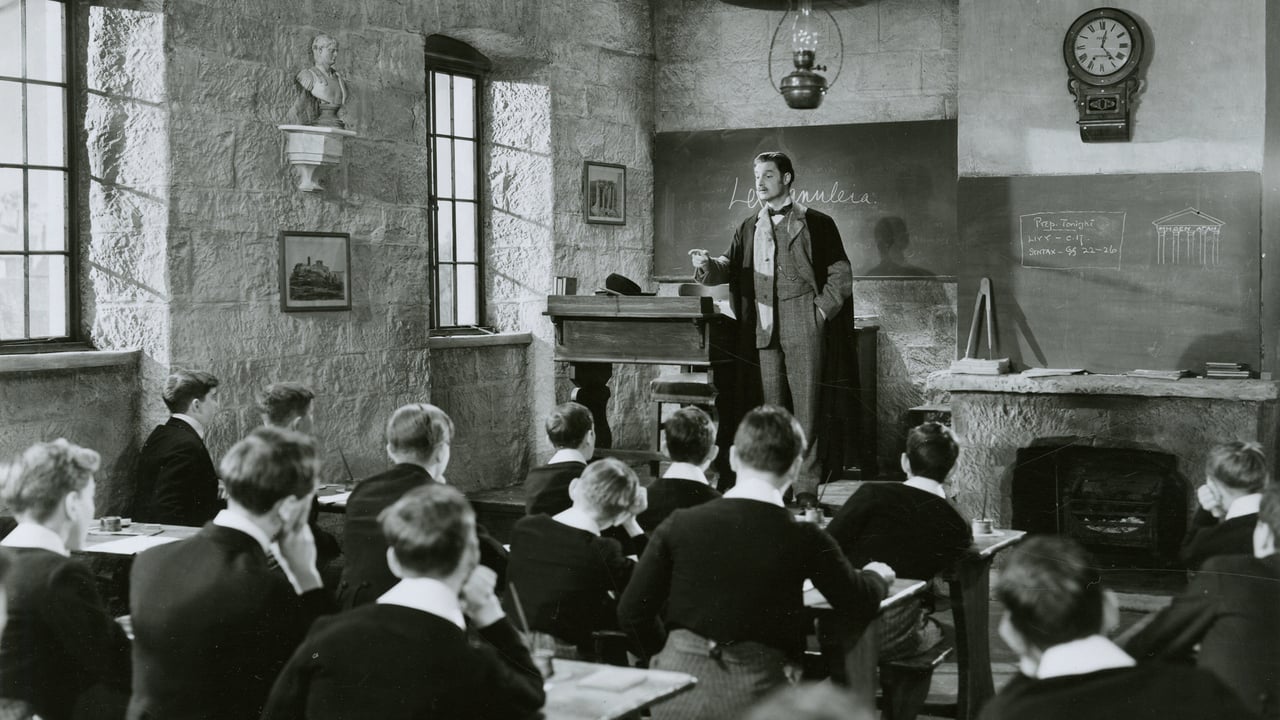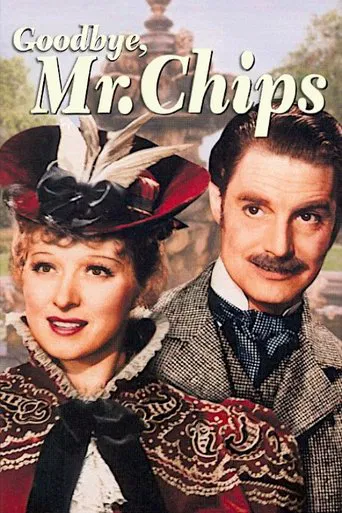

In a documentary on the MGM film studio narrated by Patrick Stewart we learnt that when MGM opened up a studio in England one of the first movies to be released from its British studio was "Goodbye Mr. Chips". It was a hugely successful film on both sides of the Atlantic Ocean confirming studio head Louis B. Mayer's faith in his new British MGM studio. The narrator also said that Robert Donat, playing a retired schoolmaster looking back on his life, gave one of the most moving performances ever put on film. Anyone seeing this movie for the first time would have to agree because he gives probably the best acting performance of a young man playing a very old man you will ever see. He teaches at Brookfields an exclusive public school for boys. As a young man he takes a holiday in Austria where he meets the love of his life Cathy played by Greer Garson. After a whirlwind romance they marry & his new wife accompanies him when he returns home to Brookfields. Before his marriage he was a rather shy & stuffy schoolmaster unpopular with the schoolboys. His wife Cathy is very charming & has the common touch which rubs off on her husband. Very soon Mr. Chips, with his wife's help, becomes a favourite with the schoolboys. Sadly, she dies during childbirth & so does the baby. After retirement he is given a house close to the school. At the outbreak of WW1 there is a shortage of schoolmasters & he is recalled to duty as temporary headmaster for the duration of the war. He reminisces that his late wife believed in him & once told him he would one day become headmaster. Later when the war is over & on his deathbed he overhears the new headmaster speaking to a colleague. He tells him, "I thought I heard you say that it was a pity I had no children. But you're wrong, I have. Thousands of them, thousands of them & all of them boys". It is one of the most moving & sentimental scenes in movie history.
... View MoreThis is a nice and quiet movie. Nothing very exciting happens in it, but when it ends you still feel that you have experienced something important...The main character, Mr Chips, is very likable, and easy to identify with.The movie captures both the romance and the reality of the school world, I think. With romance I mean: the IDEA of all the generations of young people going through a school and out into the world, and the teachers' important work in both teaching them and moulding them, is very grand. Unfortunately, often one does not realize how important a teacher has been, until long afterwards - when it is too late to go back and tell him or her "thank you". Therefore, teaching might seem as an ungrateful job...The reality - and I know this, as I have dabbled in teaching as a sub - can be quite different though. And then it can be difficult to keep up that feeling of doing an important job for mankind. The job can seem repetitive, and also "flat" - there is not much of a career in it, and you can easily feel that you are stuck in a small world, and that your own development has come to an end. Because you are never going to be anything more than a stupid teacher in a stupid school... It is then you need these romantic school-stories! Children can also be very mean and unpleasant, both towards each other and towards adults. There is always a kind of battle going on between the class and the teacher. When you are new to the business it can be very difficult to know how to behave. Because you want the pupils to like you, not fear you or hate you - but on the other hand you cannot be too "kind" either, because then they take advantage of it. If you do not come to grips with this conflict and find your own way in dealing with the pupils, there is always the risk of total mayhem - exactly as it happened for Mr Chips the first time he stood in front of a class. That scene was very realistic.The short, tragic love-story is also very fine. One is so happy for the shy Mr Chips, when he gets to experience this with a nice and beautiful young woman - despite the bad odds!
... View More1939 was truly a phenomenal year for movie lovers with such distinguished masterpieces as "Gone With the Wind", "The Wizard of Oz", "Mr. Smith Goes to Washington" to start with the most emblematic ones, and followed by the no less revered "Stagecoach", "Ninotchka" or "Young Mr. Lincoln" Yet, despite its lower recognition, "Goodbye, Mr. Chips", also Best Picture nominee, is still likely to grab the attention of a movie fan because it features the performance that won the Oscar for Best Actor, which is saying a lot in 1939. No, it was not James Stewart who won for his outstanding emotional role as Jefferson Smith, neither did Clark Gable as the iconic Rhett Butler or Laurence Olivier as Heathcliff, no fate decided that the prestigious award would go to a Robert Donat who played a shy and humble schoolmaster named Arthur Chipping aka 'Mr. Chips'. I admit that I was less eager to see the film than the performance that beat those stellar performances but the result was the same anyway. First, "Goodbye, Mr. Chips" is significant as a milestone for school movies. "Dead Poets Society", "To Sir, With Love", "Blackboard Jungle", they all owe something to "Goodbye, Mr. Chips", the inspirational story of a teacher who dedicated his whole life, 63 years, to his profession, to his boys. But don't expect the life-changing teacher, who'd open his pupils' eyes. Sam Wood's film is beyond the stereotypes it will later inspire. All we have is just a man who'll learn the most difficult job in the world and the noblest, something that demands courage, patience, understanding and a sincere enthusiasm. His authority is challenged in the beginning, making him question if he's fit to the job, but progressively, he'll try to learn to find the right balance. But it's only by meeting his future wife that his status in Brookfield will go from a good teacher to the living legend.Greer Garson, as Susan, was nominated for an Oscar in a leading role, and I can understand why it leaves some viewers perplexed. But I think she exemplifies the importance of a woman in man's life, and no man is shy enough to never find the true love, and certainly not a good man like Chips. Susan will lead the lead character, teaching him how to smile, how to overcome his own weaknesses, how to make a friend out of his kids, much more, she's the one who'll earn him his nickname. The film's second act entirely focuses on the relationship between Chips and Susan, their romantic waltz in Vienna, the Blue Danube music. And although it tragically ends with her precocious death by giving birth, we understand that she paved the way to Chips' popularity and helped him to become a living legend. I was also interested to see the film because Chips was listed in AFI's Top 50 Greatest heroes, and I wanted to know what was so inspiring about him. I think he's like Rocky Balboa, a sort of ideological hero who conveys positive values about life, about remaining true to a sort of a positive discipline. He's a man who faced war, the death of his wife, of colleagues, friend and of course pupils, and still he took the distance. Full of contradictions, he was capable of teaching during German bombings and yet delivers a eulogy to one of his German friends who taught at Brookfield. Chips valued life too much to get stuck in patriotic exaltations. He was a good man, eccentric, charismatic, funny, but a positive model.And if by no means, "Goodbye, Mr. Chips" is equal to "Gone With the Wind", in its own humbleness and simplicity, the film is capable to reach a superior emotionality that doesn't rely on epic moment or powerful dialog. It's just the sight of this humble man, going older and older, yet never letting his love toward his profession and pupils being altered by the passing of time. Robert Donat is magnificent as Mr. Chips, and I couldn't believe a 34-year old could play an old man in such a convincing way, in this cute way to stick his mouth to his mustache or to emphasizes the 'o'. Going from this mild-mannered playboy to a shy middle-aged man and then an old Einstein-looking elderly is indeed a performance that deserved an accolade. But Donat's performance and the impressive ways were not the only way to suggest the passing of time. When he comes in Brookfield to start as a teacher, kids talk about Prussians defeating the French, well the film demands a little knowledge, but we understand it's in 1870. Later, the year 1901 is indicated when a student comments about Queen Victoria's death and can't believe Britain will have a king. This summarizes what Chips incarnates: longevity. He's a 83 year old schoolmaster, a living legend, loved and admired, who's so old in his school that he taught three generations of boys, an element of his life cleverly highlighted by the three Colley's kids, all played by the same kid. Still, one of the most representative moments of the film is the many montages of pupils and students filing past and recalling their names. The flow of kids, of new faces, of children and young men, is like a metaphoric view of life as a river where it's never the same water that runs. And combined by with the ringing bells and the film's outstanding music in high volume, and Chips' deathbed words, it's impossible not to be touched by this film, and its lead character, a sympathetic character full of this same innocence that would be lost after 1939 and Hollywood would see the rise of more cynical and fatalistic genres, like the film-noir. Chips dies with his innocence, but his remembrance is eternal.
... View MoreThe central moral of the film is declared very early on: that, through the love of a good woman, Chips learns that the path to teaching success and fulfilment is to become the pupils' friend.Current teacher training policy, at least in England and Wales, is that the teacher should NEVER try to be the pupils' friend. You would almost certainly fail to qualify as a PGCE teacher if you did.That said, this is a touching movie, even if there are several mawkish moments. The school song has been deliberately composed to tug at the heart strings; the scene in which Chips insists on conducting a Latin class despite having just heard his wife and unborn baby have died is simply appalling. The dialogue designed to tell the story or illustrate the passage of the years is ridiculously unsubtle.But Greer Garson is gorgeous in this, and Donat is touching. If only school was still like this!
... View More